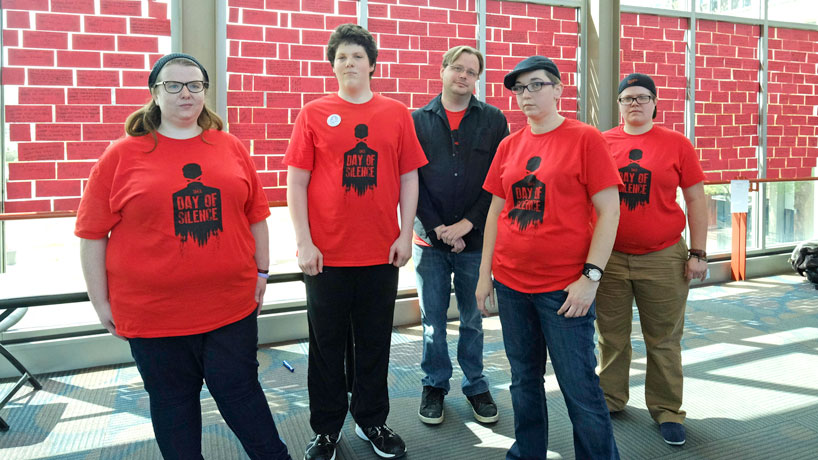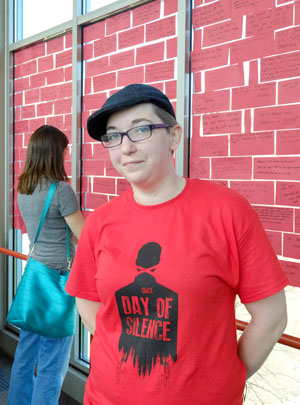
Junior liberal studies major Natalie Smith (second from right) stands with fellow members of PRIZM, the queer-straight alliance at UMSL. As president of the student organization, she oversaw the Walls of Intolerance event, where students shared moments of discrimination on red paper bricks. (Photos by August Jennewein)
With lesbian, gay, bisexual and transgender issues being tackled in state government and the Supreme Court, Natalie Smith acknowledges that times are changing in a big way.
“I view it as the civil rights movement of the 2000s,” said Smith, a junior liberal studies major at the University of Missouri–St. Louis. “LGBT issues need to be prevalent.”
As president of PRIZM, the queer-straight alliance at UMSL, she’s making sure that happens on campus. From April 13 to 16, Smith led the Walls of Intolerance event that plastered the Millennium Student Center bridge with red paper “bricks.” On those bricks, students wrote about moments of discrimination they had experienced in their life. Many shared frustrations about race, gender and class as well as LGBT issues.
“There is something to be said for knowing that somebody else has felt the same way you do,” Smith said. “And the hard truth is that in our journey even to get to college, most of us have been discriminated against, judged, felt bias or felt shame for being who we are. It doesn’t matter what your sexual identity is, what your gender is, where you come from at all – you have felt that way at some point in your life.”

Natalie Smith, PRIZM president, shortly before tearing down the Walls of Intolerance in complete silence on UMSL Day of Silence.
All of the bricks were anonymous and were open to take any form of expression, including art. Smith personally made bricks for the wall and said it was hard to have to face hurtful moments all over again.
She adapted the event from an attempt the former PRIZM president orchestrated near The Nosh the year before. But this year, Smith held the Walls of Intolerance in a high-traffic area to increase exposure and awareness.
“I think seeing something substantial and in your face – that shows all of these people deal with similar feelings – makes a statement.”
On April 16, PRIZM members tore down the wall of bricks in absolute silence as a demonstration against discrimination. The ritual tied into UMSL Day of Silence, a PRIZM event open to all students who chose to stand silently up against discrimination.
Smith came to UMSL from St. Louis Community College – Meramec, where she had been president of other student organizations. After transferring and joining PRIZM as a general member for only one semester, the presidency was passed on to her.
“This organization is close to my heart,” she said. “I knew I would be able to make the focus of this more on advocacy and bridge the gap between straight students here on campus and those that identify with the LGBT community.”
Smith credits allies, straight members, of PRIZM with helping in that effort through their example of acceptance and empathy.
“The members of the community that are straight and ally for us get lumped in with us, and they face some of the same kinds of discrimination we do,” she said. “If we’re all walking in a group, people approaching don’t assume that any particular person is straight, so they feel the same judgment we do.”
She said that this form of stereotyping deters allies from joining in the community, a pattern she hopes stops.
When stereotyping and judgment arises, Smith wants students to know that one instance of discrimination doesn’t discount them. Like all other demographics, she sees the LGBT students and allies as a vital part of the UMSL community.
“There are a good portion of students who identify as LGBT on campus. They need to have a safe space. And when they come across discrimination, they need to know there are places on campus that they can go and feel like they have people to talk to.”
Smith is referring to the “safe zones” on UMSL’s campus, where faculty, staff and students trained as safe-zone advocates welcome LGBT students to freely express themselves. UMSL safe-zone locations are marked by an upside-down rainbow triangle. For safe zones and safe-zone trainings visit umsl.edu/~safezone.
PRIZM is currently celebrating its 20th anniversary. Smith is proud to have helped the organization grow from being “just a drag show,” the annual event it was most known for.
“We have made a huge focus on trans-rape and transgender deaths from murder and suicide,” she said. “Activism and, of course, equality were other focuses. We’ve held facilitated discussions this semester to educate our members on what it actually means to be a part of this community and how individual identities are different.”
Smith poses a hard question to them, too – the same one she sees the nation trying to answer:
“How do we start a dialogue and respect each other’s realities so that we’re able to stand next to each other in understanding and peace?”















